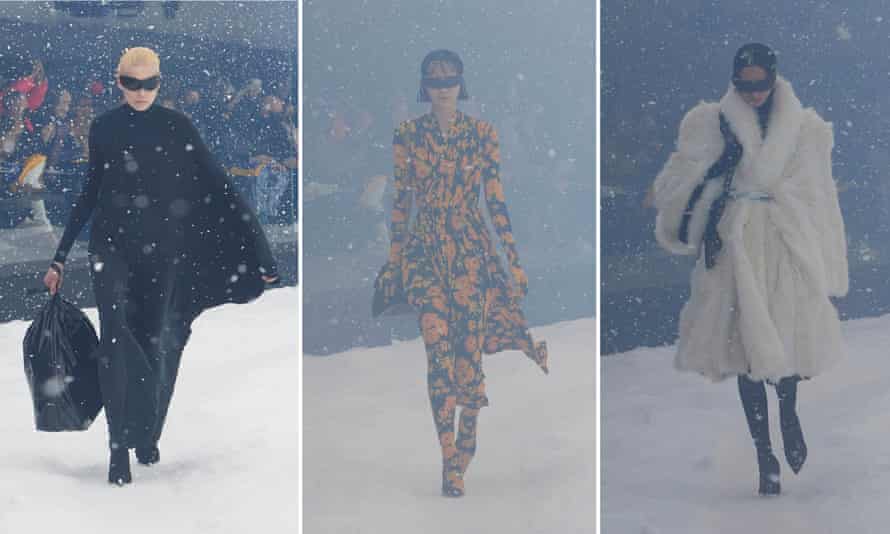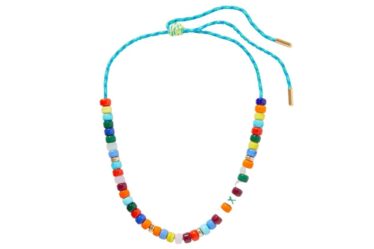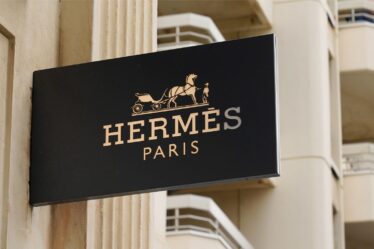
Images and Article from www.theguardian.com.
The men and women stumbled through the snow, heads bowed against the wind. Shivering in flimsy layers, they carried their possessions in sacks.
The snow was fake, and Kim Kardashian was watching from the front row. The flimsy layers will cost thousands, and the models wore spike-heeled thigh-high boots. But in a week when more than 1 million Ukrainians have been forced to flee their homes, the allusion at this Balenciaga catwalk show was clear.
It was an uncomfortable watch, and veered perilously close to using a humanitarian crisis as an aesthetic. Yet it was also, for many in the audience, a humane and powerful show of empathy, an emotion not often seen on the catwalk.
And for Balenciaga’s creative director, Demna, it was personal. “The war in Ukraine has triggered the pain of a past trauma I have carried in me since 1993, when the same thing happened in my home country,” wrote the designer, who as a 12-year-old was one of 250,000 Georgians forced from their homes by Abkhazian separatists during his country’s civil war, crossing the Caucasus mountains with his family.
A note left on each of the 525 seats, along with a T-shirt in the colours of the Ukrainian flag, said that while “fashion week feels like some kind of an absurdity”, to cancel the show would have meant “surrendering to the evil that has already hurt me so much for almost 30 years”.
“It was me,” the designer said backstage of the show when it finished. “I was seeing myself, 30 years ago, as a child in a shelter, not knowing if the roof would fall on my head.” Navigating the dissonance between fashion week and war is such treacherous territory that most designers simply steer well clear, but Demna was emboldened by his personal history.
While the models walked, the designer, who lived as a refugee in Ukraine and Moscow before settling in Dusseldorf, recited a poem in Ukrainian which, he said, translated along the lines of “your sons will save you”.
“It was an art installation. It had something beautiful to say,” said the actor Salma Hayek, wearing the blue and yellow T-shirt over her Balenciaga outfit as she waited to congratulate the designer.
Demna insisted that the medium of fashion was irrelevant to the message of the show. “Fashion doesn’t matter now. The message must be love and peace, and fashion has to assume a strong position in this crisis.”
Still, the context, as part of a showcase for a luxury goods house – one whose ultimate boss is Hayek’s husband François-Henri Pinault, CEO of Kering – is bound to strike an off-key note for many observers. Balenciaga has paused trading in Russia for now, and is supporting the World Food Programme operation to help people fleeing the war.
When the show was planned six months ago, the snow scene was intended as a comment on the climate emergency. “It was about what snow might mean in the future. And by the future, I mean now – when there are ski resorts that don’t have snow any more,” said Demna, who no longer uses his surname, Gvasalia. “But then it took on a whole different meaning, because of the crisis we are in.”
After a slow start, the fashion industry has joined in with sanctions against Russia. Louis Vuitton, Dior, Hermès, Chanel, Prada, Gucci, Saint Laurent, Cartier and Burberry have closed their Russian stores and paused online trading, as have high street brands Zara, which operates 502 Russian stores, and H&M.
LVMH, which has 124 stores in Russia across brands including Vuitton and Dior, confirmed they would continue to pay their 3,500 employees there, as did Chanel, which has 17 standalone stores across Russia as well as mini boutiques within department stores, employing 371 people.
Article shared from www.theguardian.com



